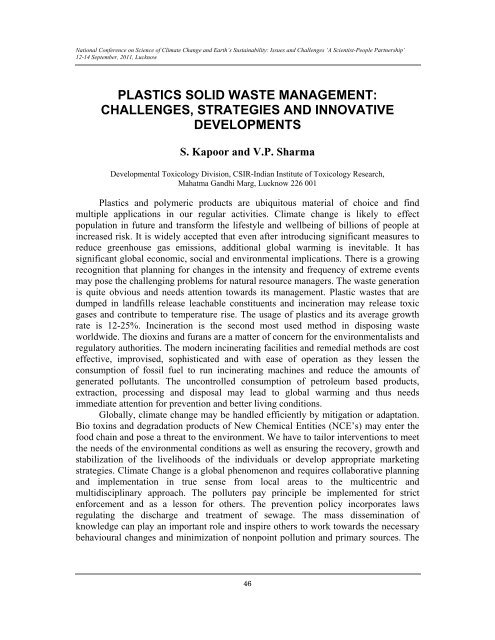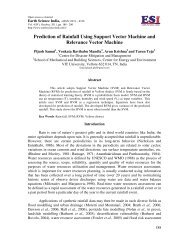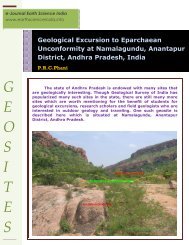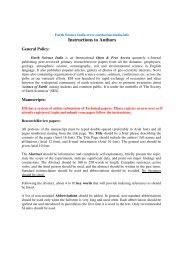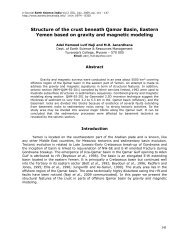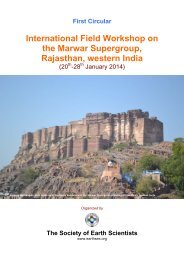12-14 September, 2011, Lucknow - Earth Science India
12-14 September, 2011, Lucknow - Earth Science India
12-14 September, 2011, Lucknow - Earth Science India
Create successful ePaper yourself
Turn your PDF publications into a flip-book with our unique Google optimized e-Paper software.
National Conference on <strong>Science</strong> of Climate Change and <strong>Earth</strong>’s Sustainability: Issues and Challenges ‘A Scientist-People Partnership’<br />
<strong>12</strong>-<strong>14</strong> <strong>September</strong>, <strong>2011</strong>, <strong>Lucknow</strong><br />
PLASTICS SOLID WASTE MANAGEMENT:<br />
CHALLENGES, STRATEGIES AND INNOVATIVE<br />
DEVELOPMENTS<br />
S. Kapoor and V.P. Sharma<br />
Developmental Toxicology Division, CSIR-<strong>India</strong>n Institute of Toxicology Research,<br />
Mahatma Gandhi Marg, <strong>Lucknow</strong> 226 001<br />
Plastics and polymeric products are ubiquitous material of choice and find<br />
multiple applications in our regular activities. Climate change is likely to effect<br />
population in future and transform the lifestyle and wellbeing of billions of people at<br />
increased risk. It is widely accepted that even after introducing significant measures to<br />
reduce greenhouse gas emissions, additional global warming is inevitable. It has<br />
significant global economic, social and environmental implications. There is a growing<br />
recognition that planning for changes in the intensity and frequency of extreme events<br />
may pose the challenging problems for natural resource managers. The waste generation<br />
is quite obvious and needs attention towards its management. Plastic wastes that are<br />
dumped in landfills release leachable constituents and incineration may release toxic<br />
gases and contribute to temperature rise. The usage of plastics and its average growth<br />
rate is <strong>12</strong>-25%. Incineration is the second most used method in disposing waste<br />
worldwide. The dioxins and furans are a matter of concern for the environmentalists and<br />
regulatory authorities. The modern incinerating facilities and remedial methods are cost<br />
effective, improvised, sophisticated and with ease of operation as they lessen the<br />
consumption of fossil fuel to run incinerating machines and reduce the amounts of<br />
generated pollutants. The uncontrolled consumption of petroleum based products,<br />
extraction, processing and disposal may lead to global warming and thus needs<br />
immediate attention for prevention and better living conditions.<br />
Globally, climate change may be handled efficiently by mitigation or adaptation.<br />
Bio toxins and degradation products of New Chemical Entities (NCE’s) may enter the<br />
food chain and pose a threat to the environment. We have to tailor interventions to meet<br />
the needs of the environmental conditions as well as ensuring the recovery, growth and<br />
stabilization of the livelihoods of the individuals or develop appropriate marketing<br />
strategies. Climate Change is a global phenomenon and requires collaborative planning<br />
and implementation in true sense from local areas to the multicentric and<br />
multidisciplinary approach. The polluters pay principle be implemented for strict<br />
enforcement and as a lesson for others. The prevention policy incorporates laws<br />
regulating the discharge and treatment of sewage. The mass dissemination of<br />
knowledge can play an important role and inspire others to work towards the necessary<br />
behavioural changes and minimization of nonpoint pollution and primary sources. The<br />
46


